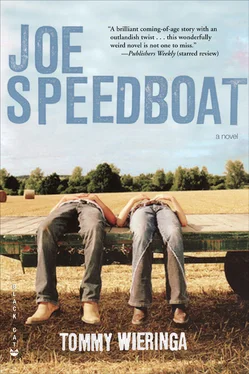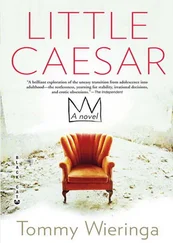Somewhere in November, Joe came back to Lomark. At least, that was when I suddenly saw him standing at my window, grinning from ear to ear. I waved to him, he came in trailing cold air. He looked bigger, standing there in my room with his heavy army coat and his rain-drenched hair. I was happy as a pup to see him. I had also run out of cigarettes, and now he could roll me a bunch. He hung his coat over the chair and sat down across from me.
How’s it going? I wrote on my notepad, and he shook his head.
‘It was about time for me to come home.’
Things were not going well, his mother and India were both on the verge of exhaustion. I looked at him as he rolled my cigarettes and dropped them in the empty mustard pot. His hair was longer, but that wasn’t what gave me the feeling something had changed. I squinted hard and tried to take him in carefully, but I couldn’t put my finger on it. Maybe I just wasn’t used to him anymore.
‘I was in Amsterdam for two weeks,’ he said.
He licked the cigarette paper and rolled it into place.
‘With P.J.’
I looked the other way. Jealousy’s as visible as a solar eclipse.
‘She’s got something going with a writer. A real nutcase.’
Joe gave me a rundown of the last few months, starting at the moment he’d left that morning on the bus.
They were going to be fellow artists there in Enschede, Engel and he. They were going to show people a thing or two. But one day in late autumn, Joe and his classmates went on an excursion to the Van Gogh Museum. During the ten minutes he stood there, the queue advanced only a few metres. Right in front of them was a busload of Japanese tourists, behind them a group of disgruntled day-trippers from Groningen who were doing their best to keep spirits high. Joe looked around. His feet were cold. Fuck this, he thought suddenly, stepped out of line without a word and disappeared in the direction of Museum Square.
And there he stood, far from home and with no reason to go back. He took a deep breath, looked around and decided to stay in Amsterdam for a while and see how things worked out.
Around dinnertime he started thinking about a place to stay. He knew only one person in the whole city: P.J. Eilander. He phoned P.J.’s mother, who gave him her daughter’s address on Tolstraat, just above a coffee shop. The coffee shop was called Babylon, if she remembered rightly.
Joe took the tram. He experienced giddying happiness — no one knew where he was, life could go any which way, there were as many possibilities as combinations on a fruit machine and every direction he chose was the right one, because it was time for the machine to pay out.
P.J. wasn’t home. Joe waited in Babylon Coffee Shop, sitting by the window where he might see her come by. Meanwhile, he had all the time in the world to feast his eyes on the economics of soft drugs. In Lomark it had been sport for a while to smoke a few quick joints and then cross the border into Germany — to come back with stories of a different planet. That was just for laughs, but smoking here was serious business. The users seemed to avoid daylight as much as possible, and applied themselves with cultish dedication to the rolling and routine firing up of huge bombers. It was truly something to see. A native from the jungle who was dropped here and saw this for the first time would think he was observing an official religious rite.
‘Hey, man, want a drag?’
Joe looked up. A man with black curly hair beneath a red cap was holding out a trumpetlike joint.
‘No thanks,’ Joe said. ‘I’m waiting for someone.’
‘Don’t be an ass, man, that’s what it’s made for.’
‘No really, thank you.’
‘You look like you could use a toke.’
Joe accepted the joint.
‘My name’s George,’ the man said. ‘The Urban Indian. But you probably picked up on that.’
Joe reappeared from behind the cloud.
‘My name’s Joe Speedboat,’ he said in a squeaky voice.
‘Joe Speedboat! You’re all right, man, you’re all right!’
Like tens of thousands of tourists, on his first day in Amsterdam Joe got stoned (‘Jesus, man, you know, if I could just build all the things I see. .’). It was completely dark outside when George the Urban Indian left, from outside the window he had shouted, ‘Good luck, Joe Speedboat! Good luck, man!’ and cycled away on his delivery bike. Joe remained behind in the blessed dreams of his first, second and third joints (‘I was really dying for a strawberry yoghurt drink, so I ordered one. That stuff ran down into my stomach like a cold mountain stream. You never tasted yoghurt drink like that’).
It will never be clear what would have happened had P.J. not run out of cigarettes that evening. She had returned home at around seven, and now she went downstairs without a coat to buy a pack at the coffee shop. The men at the pool table looked up; walking over to the counter with the jar of tobacco, rolling papers and lighters she said, ‘Could I have a pack of Marlboro, please?’
‘Anytime for you, baby, anytime.’
On her way out she saw, in the shadow of the rubber plant by the window, a familiar face. The boy, his eyes half closed, was sitting at a table littered with empty bottles of strawberry yoghurt drink. P.J. went over to him.
‘Hey, Joe,’ she said. ‘You’re Joe, aren’t you?’
His eyes opened a little further.
‘Hi.’
‘It’s me, P.J., we went to school together.’
‘Oh. Hey. I. Know. You.’
‘What are you doing here? No one from Lomark. .’
That was how Joe made his arrival, floating in a basket of reeds and encircled by feminine attention and lots of questions. Where he was staying? Nowhere? He could sleep in her bed. She always spent the night at her boyfriend’s place, she’d be back in the morning. He must be hungry, she started talking about something she called ‘the munchies’, triggered by the smoking of marijuana. But it would have been wiser for Joe not to have touched the pasta she prepared for him. He made it to the toilet just as the geyser of rosy-pink yoghurt drink, commingled with tagliatelle and tomato sauce, came rocketing up, spreading a sweet-and-sour dairy smell throughout her toilet and living room.
‘Oh. Shit. Oh. Sorry.’
‘Jesus, Joe, what did you do? Smoke the little plastic bag along with it?’
His eyes were bloodshot, his body as wobbly as on the day his father had been lowered into the grave and grief had forced him to lean against his mother.
‘You need some sleep, Joe. Lie down. You don’t want to get undressed? No? Well, OK.’
‘Hey. Thanks. A. Lot.’
The next morning he found a note.
Hey Chief Smoke ’m up
Back at noon
Breakfast is
in the fridge take
whatever you want
x P.J.
In his memory, the night gone by had lasted a hundred years. Tepid light came drizzling through the cracks in the curtains, he went back to bed and lay there with one arm under his head, smoking a cigarette. There were dead houseplants in the corners. His gaze slid over the shadows on the ceiling, which was higher than the room was broad. Breakfast, as he had seen it by refrigerator light: half a container of cottage cheese, a crescent sliver of hard cheese and half a litre of skimmed yoghurt.
When P.J. came in a few hours later, he was sitting straight as a ramrod in a chair by the window, which provided him with a view of paintless balconies and gardens where the sun never shone. The bed was made up so tightly you could bounce a coin on it, and the gas fire was turned off.
‘Wow, cheerful as the grave in here,’ P.J. said. ‘Have you been sitting in the dark all this time? Didn’t you get yourself some breakfast? Oh, I’m sorry, I’m always tense when I come back from Arthur’s place.’
Читать дальше












